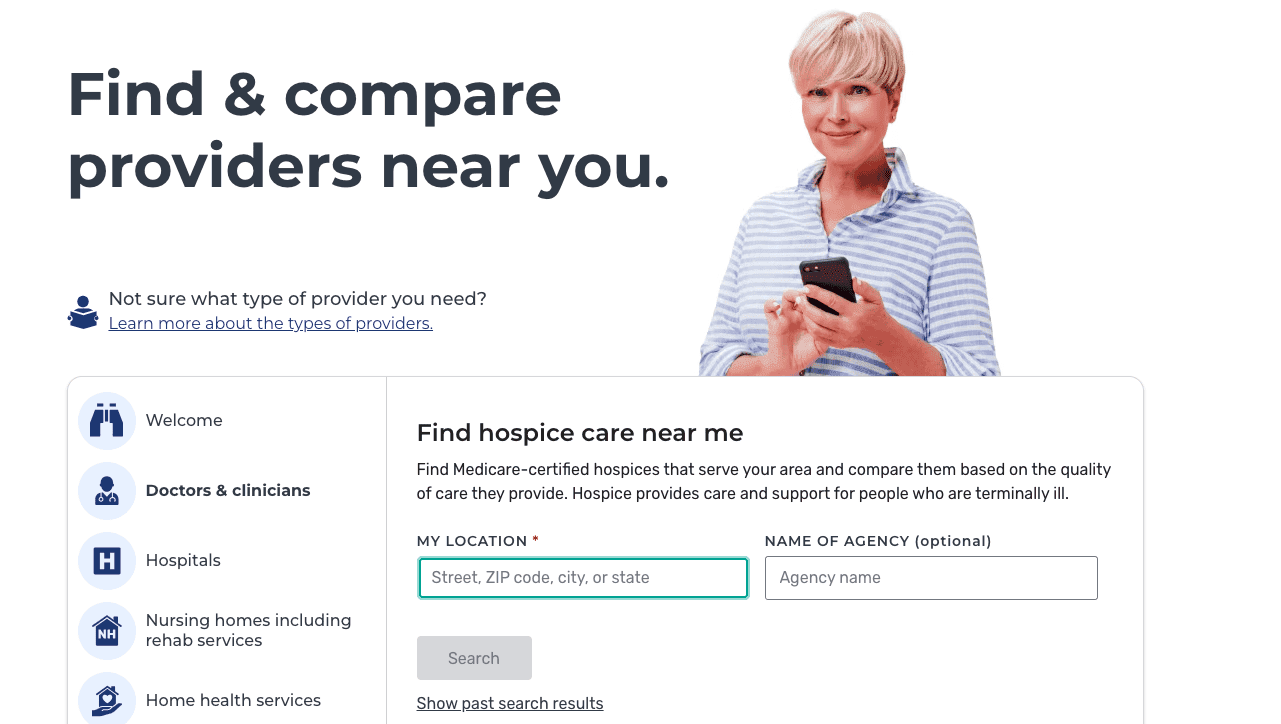
If your elderly mom or dad is suffering from a life-limiting or terminal illness, and they have just six months or less to live, hospice care is usually the best care option to ensure the quality of life for their remaining months.
However, hospice services provided by hospice agencies are not the same. It’s best to choose an agency that is reputable, ethical, and has a history of providing excellent services.
But how do you find the best hospice agency for your elderly loved one? It can be challenging to do so with many agencies out there.
This blog will guide you on how to find hospice agencies near you, factors to consider when selecting one, questions to ask, and how to pay for hospice care.
Let’s get started.
Importance Of Hospice For End-of-life Care
Hospice care, an end-of-life care option is designed for terminally ill individuals with a prognosis of 6 months or less to live.
When a patient gets to this stage, curative treatment stops and the focus shifts to ensuring comfort and quality of life for the rest of weeks and months of their lives.
This period can be challenging for the patient and family alike, but hospice care can provide the necessary physical, emotional, and spiritual support.
Benefits of hospice care
When you and your loved one opt for hospice care, you will get the following benefits:
Comfort and pain management
Hospice care prioritizes the comfort and quality of life of your loved one at this final stage. Medications and therapies can be administered to relieve them of the pain and symptoms of the illness such as fatigue, nausea, and shortness of breath.
Emotional and spiritual support
Approaching the end of life can take an emotional toll on your loved one and your family. You and your loved one may experience several emotions including anger, sadness, fear, guilt, and anxiety.

Your mom or dad may also have anxiety and questions about the afterlife and their existence.
Trained hospice counselors or therapists can provide emotional and spiritual support, offering counseling, companionship, and guidance to help you and your loved one navigate the complexities of your emotions during this time.
Enhanced quality of life
Hospice enhances the quality of life of your loved one and the family by addressing the physical, emotional, and spiritual needs allowing everyone involved to make the most of the remaining time together.
You and your loved one can reminisce about their life experiences, find acceptance, say goodbyes, and create meaningful memories
Respite care and practical assistance
Your hospice team can assist with activities of daily living such as bathing, grooming, and eating. They also step in to coordinate care between various healthcare professionals to ensure your loved one receives the best care.
Suppose you or a family member is the primary caregiver for your loved one. In that case, hospice also offers respite care, so you or the caregiver can take a break to recharge your caregiving batteries.
Grief counseling
Anticipating the death of a loved one is difficult to deal with; dealing with the aftermath of their transition can be challenging as well.
You and your family members will benefit from grief counseling to process your emotions and cope with the death of your loved one. Grief counseling can be accessed up to 13 months after your loved one’s passing.
What Are Hospice Agencies?
Hospice agencies are organizations that provide hospice services to individuals facing are facing a life-limiting illness, typically in the final stages of their lives.

These agencies deliver comprehensive hospice services in your loved one’s home or anywhere they call home, a hospice facility, or sometimes in other healthcare settings like hospitals or nursing homes.
Here are some key components of hospice agencies:
Hospice care team
The hospice agency or provider coordinates care for your loved one and puts together the ideal hospice care team that suits their situation. The team includes:
- Doctors
- Nurses
- Aides
- Chaplain
- Social workers
- Therapists
- Volunteers
Hospice Services
Hospice providers offer services such as;
- Physical support
- Emotional and spiritual support
- Respite care
- Personal care
- Bereavement care
- Advanced care planning
Collaboration and Coordination
Hospice agencies work closely with other healthcare providers, including primary care physicians, specialists, and facility staff, to ensure seamless care coordination.
They communicate regularly with your loved one’s medical team to address changing needs and preferences, facilitating a holistic approach to end-of-life care.
The benefits of choosing the right agency
Choosing the right hospice agency ensures that patients and their families receive the best possible care and support during the end-of-life journey.

Here are several benefits of selecting the right hospice care agency:
- Quality of Care: The right hospice agency will prioritize the highest standards of care for your loved one. They will provide skilled medical professionals and comprehensive services to manage pain and symptoms effectively. This ensures your beloved mom or dad experiences optimal comfort and dignity in their final days. Additionally, they offer compassionate emotional and spiritual support and coordinate care.
- Personalized Approach: A reputable hospice agency will tailor care plans to meet the unique needs and preferences of your loved one and family. They will take into account factors such as cultural background, spiritual beliefs, and personal preferences to provide individualized support and assistance.
- Access to Resources: The right hospice agency will provide access to a wide range of resources and support services, including medical equipment, medications, and community-based programs. They will help you and your loved one navigate the complexities of end-of-life care and connect them with additional support as needed.
- Respect for Patient Wishes: Choosing the best hospice agency for your loved one ensures their wishes and preferences are honored regarding their end-of-life care. They will support your loved one in making informed decisions about their treatment options, advance care planning, and goals of care
- Continuity of Care: Choosing the right hospice agency can ensure continuity of care throughout the end-of-life journey. They will provide consistent, reliable support to patients and families, helping them navigate transitions in care settings and ensuring a seamless experience from admission to bereavement support.
How To Find The Hospice Agencies Near Me
There are several ways to find hospice agencies near you. Let’s take a look at some of them.
Ask for referrals
Start by asking for recommendations from healthcare professionals, such as your loved one’s primary care physician, specialist doctors, or nurses. They often have insights into reputable hospice agencies in your area.
Contact healthcare facilities
Contact local hospitals, nursing homes, and assisted living facilities and inquire about hospice agencies they collaborate with or recommend. These organizations often have partnerships with hospice providers or offer hospice services
Use online directories
There are online directories specifically for hospice care services. Websites like the National Hospice and Palliative Care Organization (NHPCO) or the Hospice Directory can help you find hospice agencies in your area.
Additionally, the Care Compare website from the Centers for Medicare and Medicaid also gives a list of hospice providers by location. This site allows you to select at least 3 providers to compare their ratings and assess their services. This will help you streamline your list of providers you’re considering.

Check with insurance providers
Contact your loved one’s health insurance provider to inquire about hospice care coverage and to get a list of in-network hospice agencies. They can provide information on which agencies are covered by your insurance plan.
Local support groups and organizations
Reach out to local support groups for individuals with the same medical condition or illness as your loved one. These groups often have valuable insights and recommendations based on their experiences with hospice agencies in the area.
Online reviews and ratings
Utilize online review platforms such as Google Maps, Yelp, or Healthgrades to read reviews and ratings of hospice agencies in your vicinity. While reviews should be taken with a grain of salt, they can provide helpful insights from other families who have utilized their services.
State or local health departments
Check with your state or local health department for resources or directories of licensed hospice agencies in your area. They may have lists of accredited providers or regulatory information that can help you make informed decisions.
Call and Inquire
Once you’ve compiled a list of potential hospice agencies, call each one to ask questions about their services, staff qualifications, availability, and coverage area. This will help you gauge their responsiveness and determine which agency best meets your needs.
Choosing the right agency for hospice care
Keep in mind that aside from finding hospice providers, you must evaluate their quality of services before moving forward. We have provided you with some factors to consider and questions to ask before moving forward with the “ideal” provider.
Factors to consider when selecting a hospice agency for your loved one
When selecting a hospice agency for your loved one, it’s important to consider several factors to ensure that you choose the right provider. Here are some key factors to consider:
1. Reputation and Accreditation: Look for a hospice agency with a good reputation for providing high-quality care. Check if the agency is accredited by recognized organizations such as the Joint Commission or the Community Health Accreditation Partner (CHAP), which indicates that they meet certain standards of care and professionalism.
2. Services Offered: Consider the range of services offered by the hospice agency. Ensure they provide the specific services your loved one needs, such as medical care, pain management, emotional support, spiritual counseling, and bereavement support for families.

3. Staff Qualifications and Training: Inquire about the qualifications and training of the hospice agency’s staff, including doctors, nurses, social workers, counselors, and volunteers. Ensure they have experience in hospice and palliative care and receive ongoing education and training in end-of-life care practices.
4. Availability and Responsiveness: Consider the availability and responsiveness of the hospice agency. Choose a provider that can respond promptly to your inquiries and needs, including after-hours support and emergency assistance if necessary.
5. Location: Check if the hospice agency serves your geographic area and is willing to provide care at the location of your choice, whether it’s your loved one’s home, a nursing facility, or a hospice residence. Ensure they can serve patients in your area without compromising the quality of care.
6. Philosophy of Care: Understand the hospice agency’s philosophy of care and ensure it aligns with your loved one’s values and preferences. Some agencies may focus more on holistic care and patient autonomy, while others may emphasize medical interventions and symptom management.
7. Communication and Collaboration: Evaluate the hospice agency’s communication and collaboration practices. Choose a provider that fosters open communication among caregivers, patients, and families, and collaborates effectively with other healthcare providers involved in your loved one’s care.
8. Cost and Insurance Coverage: Consider the cost of hospice care and whether the agency accepts your loved one’s insurance plan or Medicare/Medicaid coverage. Inquire about any out-of-pocket expenses, copayments, or financial assistance programs available to help cover the costs of care.
9. Testimonials and Reviews: Look for online reviews and testimonials. Hearing about other families’ experiences with the agency can provide valuable insights into the quality of care and support they provide.
10. Gut Feeling and Comfort Level: Trust your instincts and consider your gut feeling about the hospice agency. Choose a provider that makes you feel comfortable, supported, and confident in their ability to care for your loved one with compassion and dignity.
Paying for hospice services
Paying for hospice services typically involves a combination of private insurance, government programs, and out-of-pocket expenses. Here are the main ways hospice services are paid for:

Medicare
Medicare Part A covers hospice care for beneficiaries who meet certain criteria, including having a terminal illness with a life expectancy of six months or less if the illness runs its normal course.
Medicare covers all hospice services related to terminal illness, including medical care, nursing services, medications, medical equipment, and bereavement support. Beneficiaries may be responsible for minimal copayments for prescription drugs and inpatient respite care.
Medicaid
Most state Medicaid programs also cover hospice services for eligible beneficiaries, following similar guidelines to Medicare. Medicaid covers all hospice services related to the terminal illness, including medical care, nursing services, medications, and medical equipment.
Eligibility criteria and coverage details may vary by state, so check with your state’s Medicaid agency for specific information.
Private Insurance
Many private health insurance plans, including employer-sponsored plans and individual policies, cover hospice services. The extent of coverage will depend on the specific plan, so it’s important to review your loved one’s insurance policy or contact their insurance provider to understand what hospice services are covered and any out-of-pocket costs you may incur.
Veterans Affairs (VA) Benefits
The Department of Veterans Affairs (VA) offers hospice benefits to eligible veterans through the VA Medical Centers and community-based programs.
VA hospice benefits cover a range of services, including medical care, nursing services, medications, medical equipment, and bereavement support. Eligibility criteria and coverage details may vary based on the veteran’s service-connected disability status and other factors.
Private Pay
If your loved one does not qualify for government programs or insurance coverage, they may need to pay for hospice services out of pocket. Hospice agencies may offer payment plans or financial assistance programs to help individuals and families cover the costs of care.
It’s best to discuss payment options with the hospice agency to understand the financial costs and available resources.
Get Started With Compassionate Hospice Care
In a challenging time such as this, it’s important to have a hospice agency that can be your ally. A provider that offers holistic support, and respects the wishes of your loved one and family.
Amy’s Eden Senior Care can be a helping hand during this time. We’ll advocate for your loved one’s wishes, and ensure they spend the rest of their lives (even if short), in comfort and dignity surrounded by the family they love.
If you’re looking to get started with hospice care for your loved one, reach out to us today to learn more about our services, and how we can give you and your loved one peace of mind.




